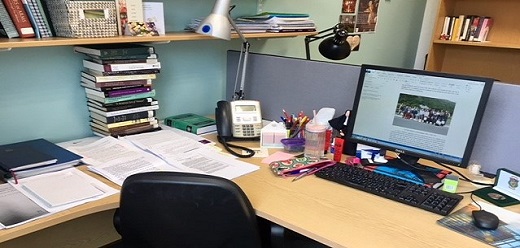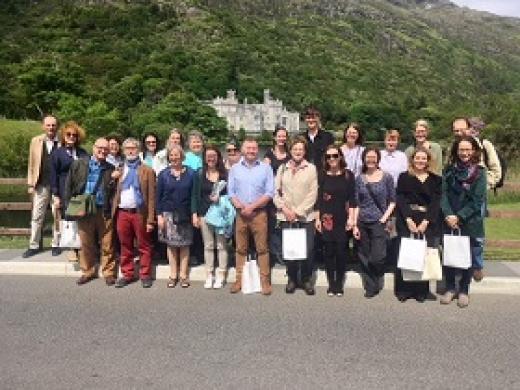
Earlier this year I commenced a one-year post-doctoral fellowship position at the Moore Institute, NUI Galway. Funded by the National University of Ireland, during the tenure of the fellowship, I will carry out the necessary research to complete my book project on early modern Irish nuns, tentatively entitled, ‘Suppression, migration and reintegration: a study of Irish women religious, 1530-1750’. Having already spent two years at the Moore Institute as a post-doctoral researcher on the RECIRC project, the transition in terms of working environment was a relatively straightforward one (a short move down the hall). However, the transition from working within a large team setting to one in which I am the only member of the team has been a little more daunting. Because my current position is predominantly research focused, I haven’t had the same challenge of balancing time between teaching and research demands. My work up to now has involved planning and conducting research trips to various archives and libraries, writing (and re-writing) book chapter drafts, as well as attending regular meetings with my project mentor (Professor Marie-Louise Coolahan) to discuss progress and plan next steps.
Admittedly, my summer season this year doesn’t look very different to the previous few months, although Summer 2018 has brought the realisation that I am now almost half way through a one-year position.The pressure is mounting to produce altogether more polished and complete chapter ‘drafts’. As a result, I am working to a very tight schedule of deadlines over the next number of weeks and months meaning that 2018 is shaping up to be one of my busiest summers yet. As an earlier contributor to this blog series highlighted, in order to cross the finishing line and get a complete book manuscript in hand (the ultimate goal!), full days tied to the writing desk are essential (not to mention copious amounts of caffeine). Dedication to a full time writing schedule is a difficult task at the best of times but probably even more so during the summer months when a barrage of holiday selfies on social media can induce severe bouts of FOMO (fear of missing out). Certainly the recent Irish ‘heatwave’ did little to ease this. But sun or no sun, the deadlines must be met.

Of course, completing my book manuscript was not the only task before me this summer. Academic work is multifaceted, and several other tasks got in the way of those all important manuscript deadlines. In June I co-organised (together with Marie-Louise) the annual History of Women Religious of Britain and Ireland conference . The conference, which took place at NUI Galway, was almost a full year in the planning and I’m pleased to say that it was a great success. We welcomed over 60 delegates to Galway. Thirty-seven speakers – from Canada, Belgium, Portugal, the UK, the USA and Ireland – debated concepts of space and place as they pertained to the lives of women religious from antiquity to the modern day, across thirteen parallel sessions (the conference was live-tweeted under the hashtag #HWRBI2018). A real highlight of proceedings for me was the contributions made by members of local Galway convents, among them Sister Faustina Grealy from the Poor Clare Monastery and Sister Alberta Ní Mhaolalaidh from the Dominican convent in Taylor’s Hill. The conference was rounded off with a day trip to Kylemore Abbey in Connemara, home to a community of Irish Benedictine nuns since 1920. A full report on the conference is available here.
As well as conference organisation, June also witnessed the arrival of a deadline for the completion of article proofs. Arising from my work with the RECIRC project, this article applies digital tools (specifically network analysis tools) to letters written by and about early modern nuns and is forthcoming in the next issue of the Journal of Historical Network Research . As with any piece of academic writing, it was a long time in the making so sending the final proofs to the editor was a massive and very welcome relief. As my thoughts turn to summer 2019, however, that relief is somewhat tempered by the uncertainty of what my job then might be or indeed whether I will have one! This of course is not a struggle unique to my own situation. The increasingly precarious nature of the academic job market means that most newly qualified PhDs will contend with job insecurity (often for prolonged periods). Professor Eunan O’Halpin’s recent exhortation that the Irish Universities Association (IUA) invest in ‘making academic employment fairer by nurturing the cohorts of young scholars whom Irish universities still seek to employ on cheap, insecure and exploitative terms’ is one that I hope will be reiterated by those in senior positions across the sector. For now though, it’s on to the next deadline!


